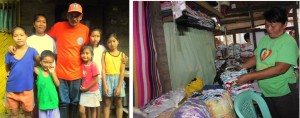
With the monthly cash grant of as much as P1,400 for three qualified children, many continue to wonder how beneficiaries of Pantawid Pamilyang Pilipino Program stretch this out to meet the education and nutritional needs of their children until the next grant.
But for them, this is not even a question.
In a recent random interview of beneficiaries from 17 barangays in the cities of Manila, Quezon, San Juan, Mandaluyong, Caloocan, Malabon, Marikina, Navotas, Pasig and Valenzuela, and the municipality of Pateros, they are one in saying that the grants they are receiving from the program have helped them augment their resources to meet their children’s daily need.
For Milagros Dizon of Batasan Hills, Quezon City, the cash grants she receives go to the education and health needs of her children, adding that they now have school supplies, such as bags, shoes, and uniforms.
She also buys them vitamins, and happily shared that, “Hindi na sila madalas nagkakasakit (They do not get sick often).”
The beneficiaries stressed, however, that they do not completely depend on the grant to survive life’s daily grind.
For instance, a family of six with three children-beneficiaries getting P1,400 a month would have an estimated budget of P234 per family member. This is hardly enough to take care of all their needs, hence, the beneficiaries look for other sources of income.
Department of Social Welfare and Development (DSWD) Secretary Corazon Juliano-Soliman said that this statement of the beneficiaries disproves public perception that the program is a dole-out and leads to dependency.
“The beneficiaries can not only depend on the cash grant to take care of all their needs, that is why there are skills training and livelihood programs offered to them so they can move from survival to self-sufficiency,” Sec. Soliman stated.
Taking extra work
The beneficiaries shared how they make both ends meet, showcasing their resiliency, flexibility, and hard work. Taking extra work to augment the cash grants they receive from Pantawid Pamilya is one way the beneficiaries manage to sustain their families’ needs.
For instance, Elsie M. Dato, 35, from Barangay 8, Caloocan City said, “Ume-extra ako, nag-aalaga ng bata (I get extra work such as taking care of children of my neighbors).”
Mischelle N. Iradiel, 33, from Brgy. Callejon II Sta. Cruz, Pasig City stated, “Nagtitinda ako upang may dagdag kita pambili ng pagkain (I sell things to earn additional income to buy food.)
On the other hand, Phoebe S. Alcanar, 43, from Brgy. Malanday, Marikina cited strict budgeting as her technique of managing their daily expenses.
“Binabadyet kong mabuti ang pera para magkasya (I budget our money well to cover all expenses),” Phoebe stated.
“Mananahi kaming mag-asawa kaya may pinagkukunan ng panggastos (My husband and I sew clothes so we have a regular source of income),” she added.
“Kailangan din naming magsumikap at magtrabahong maige upang maiangat ang antas ng aming kabuhayan at hindi umasa lamang sa tulong ng gobyerno (We have to persevere and work hard to improve our quality of life, and not just to depend on the government’s help),” the beneficiaries stated.
Regular jobs
Further, the beneficiaries said that they have regular jobs to sustain their family’s nutritional needs and claimed they get to eat a variety of viands, such as meat, chicken, vegetables, and fish.
Inquired as to how much of their income do they allocate for the purchase of food, most replied they usually spend P200 a day for three meals.
Their responses indicate that the program is on track in achieving its goal of empowering poor families including the improvement of their nutritional status.
Convergence
Beneficiaries are also able to avail of assistance through convergence with other government agencies, such as the Department of Public Works and Highways (DPWH) which provides them gainful employment through the Trabahong Lansangan, which involves road maintenance and street sweeping.
Beneficiaries in other regions attest to this.
Leo C. Moriles from Brgy. Lower Caynaga, Lope de Vega, Northern Samar is one of the fortunate beneficiaries who was given work through Trabahong Lansangan. Leo and his wife Jocelyn were blessed with five children.
He narrated that before Pantawid Pamilya, they used to live a hand-to-mouth existence. Then, every day is a fight for survival because of unstable work with very minimal pay.
“Dakoan akon pagpasalamat nganat aganak pati anak on pamilya sininga mga benepisyo (I am so thankful that my family and I and have been given these benefits),” said Leo, who is earning P409 a day as a worker of Trabahong Lansangan.
Leo is grateful for this project which has helped his family a lot.
He stated that he no longer needs to scrounge around for any work so he could put food on the table. The earnings he gets from this work suffice for their daily needs.
Leo was able to purchase a motorcycle through a loan, and uses this to transport passengers while he is not at work. He used his earnings to pay for the monthly amortization of the motorcycle, while the excess amount is set aside for emergency needs.
Valuable learnings
Leo cited that the lessons he learned from Family Development Sessions (FDS) and other Pantawid Pamilya meetings have contributed to the positive changes in their family.
He learned self-discipline, gained knowledge, enhanced his skills, and realized the value of time. He added the these are learnings which he would always bring with him.
This was echoed by the other beneficiaries who shared how the FDS helped them realize their responsibilities as parents.
Ensuring adequate food supply through backyard gardening is also included in the enhanced modules of the FDS.
“Sa sarili nilang pag-sisikap at tiyaga, kaya ng pamilyang Pilipino ang pagbabago (With their hard work and perseverance, the Filipino family can create positive change in their lives),” Sec. Soliman emphasized. ###


